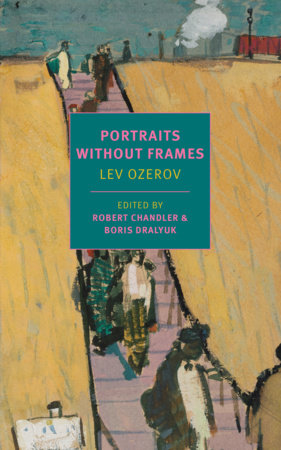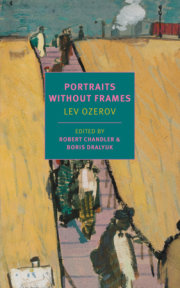Nominated for the 2020 Read Russia Prize
“Ozerov’s [poems] provide a formula for reading life as art. Closing the book, I found myself viewing my own interactions with Ozerov’s empathetic eye. If literature cannot inspire this kind of empathy, what can?” —Amelia Glaser, Times Literary Supplement
“Attention. That word rings over and over through the poem-filled pages. This gentle attention is what makes the collection such a treasure.” — Alisa Goz, Russian Art & Culture
"Few traces of youthful sentimentality are evident in Portraits without Frames, Ozerov’s last poetic work and first to be made available in English. Originally published posthumously in Russia in 1998, Portraits is an anthology of fifty free verse tableaux based on encounters with Soviet writers, artists, and cultural figures ranging from the world-famous (Anna Akhmatova, Boris Pasternak, Dmitry Shostakovich) to the lesser-known (Yiddish poets Leyb Kvitko and Dovid Hofshteyn, arrested and shot on Stalin’s orders in 1952)....By telling their stories, preserving their portraits, Ozerov has done what is hard: to speak about that which one cannot change. But harder still to change that about which one will not speak." —Alexander McConnell, Cleveland Review of Books
"The name Lev Ozerov may strike non-connoisseurs of 20th century Russian literature as an atypical choice on the part of the New York Review of Books Publishing House, which in this same “Classics” collection has published Tsvetaeva, Pasternak, and Mandelstam. It’s no wonder: leafing through, we realize at first glance that beyond his own capacity of poet, editor, and translator, this Ozerov is singular in his position of witness...There isn’t much to say about the translation beyond that it is excellent. Never does a poem lose its essential spirit. It’s difficult enough to co-translate a book, much less group-translate. This requires the sacrifice of complete invisibility—or, better, of transparency. It is notable that it is a very approachable translation, quite neutral and modern." —Andreea Scridon, Asymptote Journal
“Ozerov’s poems offer the reader poignant Soviet portraits-in-poetry, illuminated lives of the everyday and the literary Soviet saints. In these translations the finely wrought poems shine with their original wistfulness, love, and dedication: tramps, poets, and friends mingle in short deft snatches of stories.” —Sasha Dugdale
"In this long and profoundly moving cycle of poems, Ozerov recalls his meetings with the great and notable in Russian arts over the Twentieth Century, and the results are breathtaking....Ozerov certainly mixed with just about all the great and good in Soviet art, and the fifty accounts of his meetings with them reminded me just how many incredible artists the country and the era produced – even if they had to write for the drawer a lot of the time. Each poem is preceded by an introduction outlining the life and work of the subject; each translation is individually credited; notes are provided when necessary to illuminate the poems; so this really is an exemplary volume and a flawless reading experience." —Kaggsy's Bookish Ramblings




